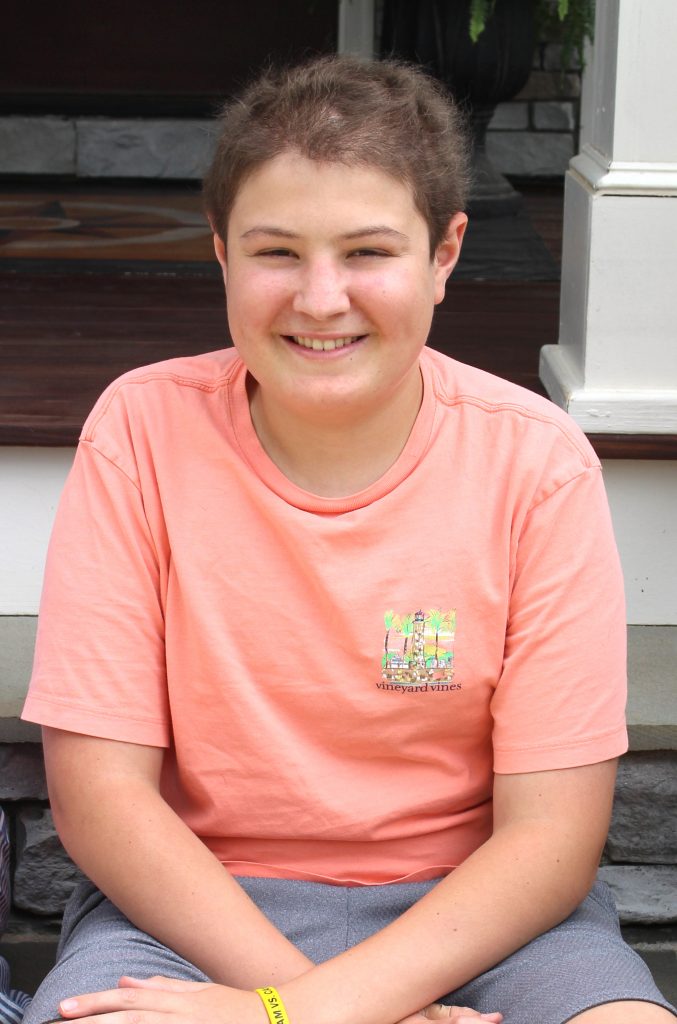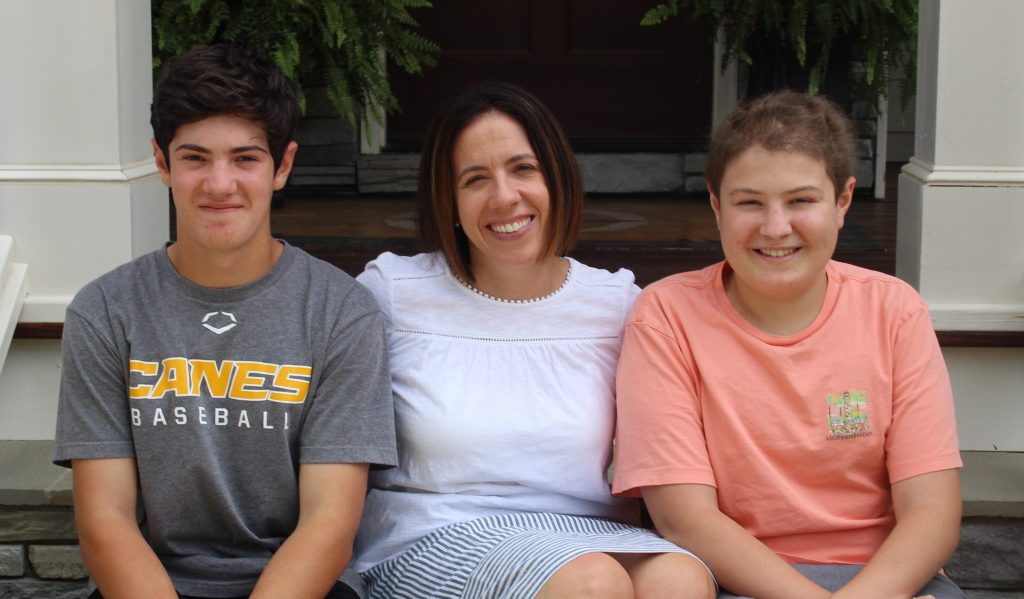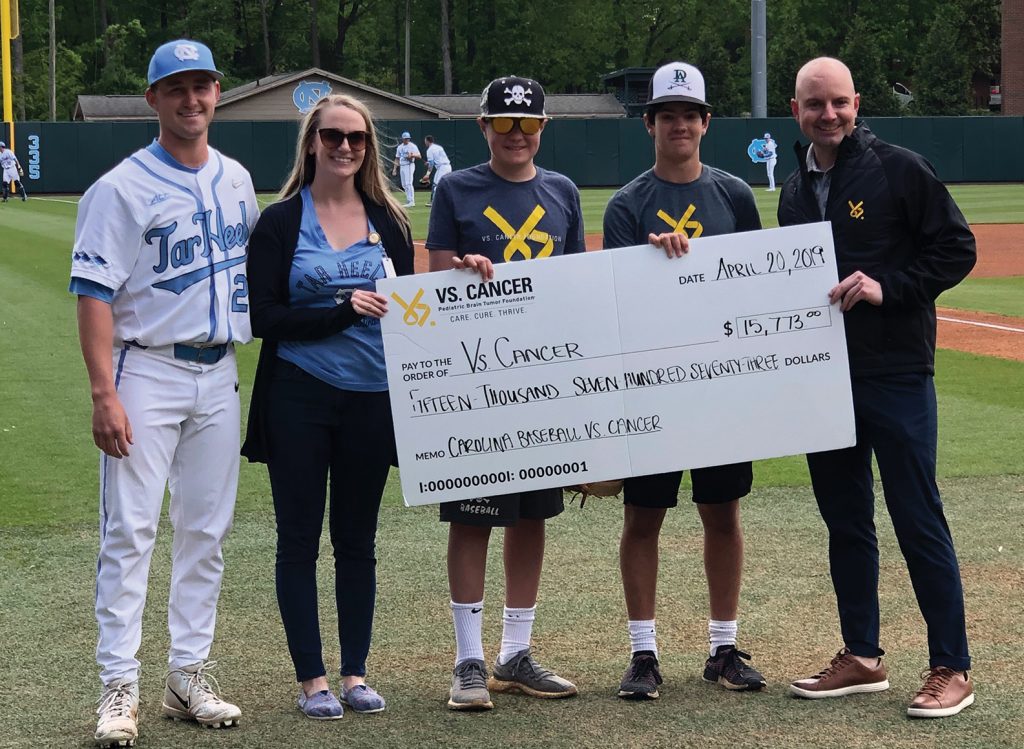
November, 2018, brought a new reality for 14-year-old Jack Goldstein and his family. Not only did Jack learn he had leukemia, but his diagnosis also meant a new normal for his dad Jay, mom Avery and brother Ethan, 16.
Jack’s immune system was compromised, which meant changes for the family’s routine. No travel during the December holidays, a time typically spent with extended family; both he and Avery, a fifth-grade teacher, had to leave classrooms at Durham Academy behind; and the hardest of all, no training for baseball, Jack’s favorite sport.
Coincidentally, it was how his body responded to some baseball workouts that led Avery to suspect something was amiss. Jack had a spot on an elite baseball team and was working with a trainer to hone his baseball skills. Avery said Jack was sore all the time, but she just chalked it up to growing pains or hard work with the trainer.
After a rainy baseball tournament in fall 2018, Jack developed a fever that led him to miss a game. Avery suspected mono, and then Jack started complaining that his side hurt. Still thinking her son had mono based on his symptoms, Avery made a doctor’s appointment.
“They took his blood and thought the equipment was broken,” Avery said.
After an appointment with Jack’s regular pediatrician, they found out it was leukemia. “The doctor told me to pick a hospital and go to the ER right now,” she said.
“I asked if I had what Dr. Zaas had,” Jack said, referring to a family friend who also had leukemia. Soon after having his vitals taken at UNC, Jack got the news from UNC Lineberger’s Thomas Alexander, MD. He had leukemia, and things were about to change.

From the moment Jack spoke with Alexander, Avery was impressed by the focus on her son. All questions and discussions were directed at him, and she appreciated the way everyone took the time to speak with her son as a person, rather than a teen with cancer.
“It is hard to be a teenager, and hard to have something where you’re not treated as an adult, but you’re not a kid,” she said. “They are treating him; giving him all his info, answering questions not in a babyish way.”
With Jack confined to the house except for treatments, the family had to adjust to their new normal and found that they grew closer.
“When there’s a bad day, it’s all we talk about,” Ethan said.
“Jack lost everything,” Avery said. “He wasn’t a student; he wasn’t an athlete. He had no energy and could barely use his arms.”
A special note of encouragement
But when things got hard for Jack, he had some help from pediatric cancer nonprofit, VS Cancer. The organization reached out on Jack’s behalf to Chicago Cubs’ first baseman Anthony Rizzo, a lymphoma survivor, for some much-needed encouragement.
“Right when I was feeling down, I got a letter and picture from Anthony Rizzo, and a video from (Chicago Cubs manager) Joe Madden,” Jack said.
“The letter was especially motivating,” Avery said. “Jack was most worried about how his illness impacted his family, and it was hard to keep a positive attitude. But Jack has exuded that.”
A team’s support
Knowing that one of their own was having a hard time, the Durham Academy baseball coach wanted to do something for Jack, who missed being part of the team. The school’s lacrosse team had held a fundraising tournament for VS Cancer in past years, and both coach and family thought earmarking the funds for UNC Lineberger, where Jack was receiving treatment, was a good idea.
The tournament was designed so each school set its own fundraising goal, and the school that raised the most money won the right to decide what organization would receive all the money raised. “We’re all competitive people,” Avery said of Jack’s teammates and their families. “It was important to us to see the money go locally, to see it go exactly where Jack is getting treatment.”

The family was thrilled to have an answer to the commonly asked question “What can I do to help?”
“Someone would ask if they could do something, and you could ask them to donate,” Jack said.
“We never thought ‘Oh, Jack needs this.’ He was just happy how he was. We were living our regular lives, but that’s how people helped us,” Ethan said.
“It felt good because people were asking how they could help, and it was weird because I didn’t feel like I needed anything, but I didn’t want to say that,” Jack said. “This felt like something that could help me and help other people. And help people helping me.”
With the family cheering donors on, and some strategic donors that kept careful track of each school’s totals, the fundraising campaign among eight regional high school lacrosse teams raised more than $79,000 for UNC Lineberger. In a true show of support for a fellow athlete, the UNC baseball team raised $15,733 and Chapel Hill High School and East Chapel Hill High School baseball teams raised $13,578 to support the effort.
Support from the clinical team
Like anyone with cancer, Jack has had ups and downs with his treatments, and he credits the UNC Lineberger doctors, nurses and staff with helping him get through it. In addition to regular attention from Alexander and nurse practitioner Kristi Geib, RN, MSN, CPNP, CPON, Jack has a full care team at his back. A bad reaction to steroids left him unable to use his arms, but after physical therapy with UNC Children’s Sabina Beckler PT, DPT, Jack is nearly recovered. The stress of the hospital visits was also overwhelming, but Jack said UNC Lineberger’s Justin Yopp, PhD, helped him cope with his situation.
“Dr. Yopp really helped me, because I was stressed out,” Jack said. “I had PTSD from the hospital. Every time I’d go in, I would throw up, and he helped me get over it.”
“Every single nurse we have dealt with is amazing, and they are unsung heroes for sure,” Avery said. “They do a really good job making you feel normal whatever you’re going through.”
As an athlete, Jack also says exercise has helped both his mood and body improve. He will spend most of the summer in treatment, but says he’s looking forward to working on hitting and pitching with his baseball trainer again. He’s already been leaning on his older brother for some fielding practice.
As Jack nears the end of his treatment, his family is happy to see the light at the end of the tunnel but are also thankful for the time they spent together.
“When we look back on this time, even now, I think what stands out is Jack wanting everyone else to be happy and him really pushing through,” Avery said. “I already forgot a lot of the hardest times, but what sticks with me is how many people are supporting Jack. This has shown us how lucky our son is.”
